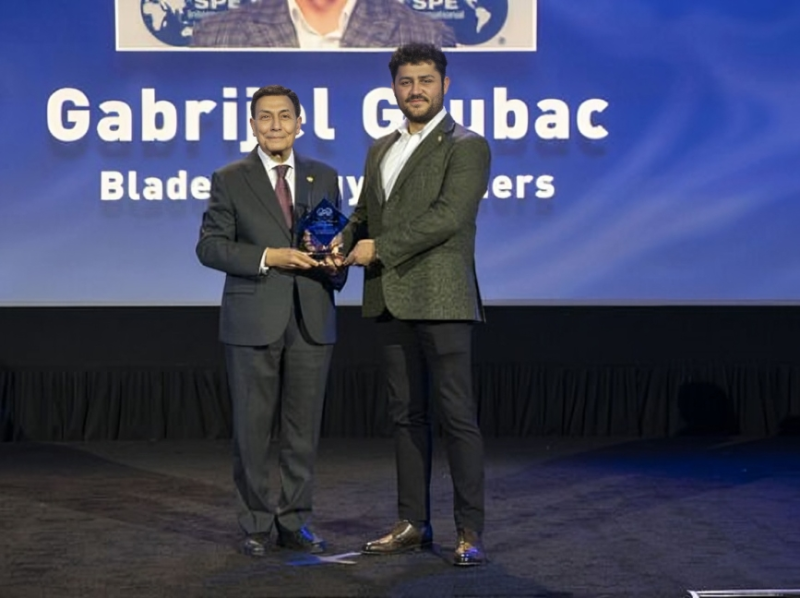The Way Ahead interviews Gabrijel Grubac. Grubac is a senior engineer at Mazama Energy where he focuses on stimulation and completion projects across unconventional/conventional and deep geothermal projects.
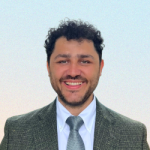
He has previously worked in different roles as global completion lead at Seismos, senior stimulation engineer in the production technology team at OMV Petrom, Black Sea, and senior engineer in stimulation for Halliburton in the US, UAE, and Saudi Arabia—offshore and onshore.
Join us as he shares insights on international experiences, the future of sustainable energy, and the importance of curiosity, education, and collaboration in shaping the energy industry.
The Way Ahead (TWA): What inspired you to pursue a career in petroleum engineering?
Gabrijel Grubac (GG): Nineteen years ago, I took a trip to the Libyan desert where my dad used to work for a company that was drilling for water. The moment I saw the rig (in hindsight it was not that impressive) and the logs that looked like electrocardiograms, I knew I was in love. I started researching and understood that an industry with such breadth and global footprint could be the way forward. I enrolled in the program and the rest is history. I fell in love with the challenges and opportunities it brought into my life. Imagining a fluid or gas particle on its journey from kilometers underneath us to the surface to power the world speaks for itself.
TWA: You hold BS and MS degrees in petroleum engineering. How has obtaining a master’s degree helped further your knowledge and career?
GG: At the time I did it, it did not seem to be a straightforward tool to further my career as much as it was to attain more knowledge. Then 3 years ago, I found myself applying for a job in Europe that required a master’s degree to even be considered. I think that if you are driven by the desire to learn more and couple it with informed decisions on what the industry might be looking for, you might just have the perfect formula to be in a place you enjoy working and growing.
Continuous education is important. Whether it’s for a degree or not, staying curious is a fueling process for the mind so I always suggest continuing to find your next thing of interest.
TWA: You’ve held roles across the globe. How has this international exposure influenced your approach to engineering, project management, and working with different people and cultures?
GG: I cannot stress enough how important being out of your comfort zone and exploring opportunities early in your career is. We can only shape our perspective by exposing ourselves to different environments and that includes cultures, languages, and geographically different places. I have learned so much about cultures and how different people can be, but how connected we can get through the same passions.
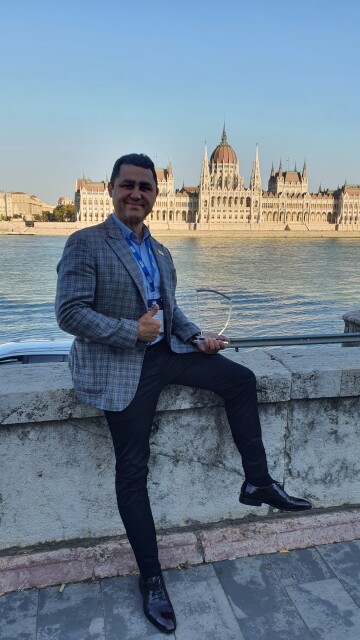
International exposure has enriched my resume and most definitely helped me get jobs and assignments that favored exposure. If you have the opportunity, especially early in your career, accept that international assignment. You will almost never regret it.
TWA: Can you tell our readers about the work you and your company are doing in geothermal? How does your company innovate? What is the process for generating new ideas?
GG: Being at the forefront of science in terms of geothermal energy and striving to create the next-generation power source that is clean and sustainable is challenging and very fulfilling. Achieving geothermal work >300°C and planning implementation of superhot rock horizontal wells at 400°C are quite directly a reflection of innovation and future energy mindset.
The creativity and ingenuity of top professionals in energy has been very humbling for me. Thinking outside of the box in terms of technical approach has enabled us to create a path forward to de-risk superhot rock geothermal and hope to make a clean-energy- dense future a reality. Where I work is innovation on a daily basis. A process that requires decoupling the mindset from the oil and gas approach and finding new ways to find solutions in geothermal. How do we generate ideas? By questioning the status quo and allowing everyone to say and ask things that were deemed ‘impossible.’ It is a beautiful process when technical and creative minds engage.
TWA: What has been the most challenging aspect of working on geothermal projects so far?
GG: Diving into an environment that has been untapped in the ways we are striving to. From material selection to completion systems and heat-harvesting methodologies, the process brings challenges that have not been thought of in the past. I believe understanding rock mechanics at very high temperatures and interaction with fluids is one of those challenges that needs further development and understanding.
We need a lot more research and development as well as pilot projects to de-risk and speed up the implementation of next-generation geothermal in our energy mix.
TWA: What recent advancements in geothermal technology do you find most promising?
GG: The exciting part about the current momentum geothermal energy has attained is that research and development is engaged in various fronts. From drilling technologies to completion work, we are thinking out of the box. I think that enthalpy will save the world of energy, and in this case that would be superhot rock geothermal.
Achieving supercritical working conditions will be one of the milestones shaping the future of energy. In that context, advancements in enhanced geothermal systems and the ability to synthesize an artificial reservoir where flow of water could harvest heat in quantities to generate power stands as one of my favorite recent advancements. Not to take anything away from low-enthalpy geothermal where heat pump technologies are being optimized and worked on to maximize the usage of geothermal.
TWA: What skills or tools have you found most critical in designing and implementing stimulation treatments?
GG: It is imperative to have a multidisciplinary approach when designing stimulation treatments. Without first understanding the goal of the project from project managers, to getting a sense of the depositional environment and structure from geologists, to getting data from drilling engineers, stimulation treatments can become isolated events of pseudo-science. I think one of the top skills needed is effective communication and understanding the reservoir and damage mechanisms before diving into stimulation design.
Similarly, meaningful data for models including realistic assumptions is crucial. Understanding the dynamics of fracture geometry and how that translates into additional hydrocarbon production or heat harvesting is of great importance. My personal approach is imagining I am the reservoir particle. What would it take for it to be produced at the highest efficiency and lowest cost? Start there and take it one step at a time.
TWA: What advancements or innovations do you foresee shaping the future of stimulation and completion technologies in geothermal?
GG: This is one of my favorite questions. One of the crucial challenges that can find its solution quite soon is the ability to distribute fluid uniformly or as intended in a lateral during stimulation to maximize fracture geometry and surface area and utilize the same design to enable uniform injector to producer profiles along laterals where thermal short circuiting is avoided early in the project. Therefore, limited entry sleeves to orient flow is something I foresee changing the game in terms of more efficient heat harvesting in geothermal. Similarly, material selection and cement advancements will play a great role in enabling the wells to handle cyclic loads and allow better isolation of stages during stimulation.
TWA: How do you envision your role in promoting sustainable energy solutions, particularly through geothermal projects?
GG: I have passion for what I do. And I like to believe that when we love what we do, we can manage to make certain changes that will cause other changes to improve the energy future. My engagement with SPE and the student/young professional world gives me the opportunity to talk about geothermal from the basics to possible future avenues of meaningful energy contribution in many parts of the world.
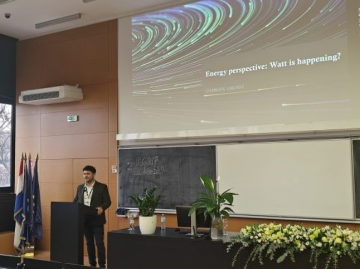
I believe that workshops, seminars, and discussions with peers will help spread the word and at its best engage young professionals and students to get curious. Once that is attained, it becomes a self-sustained process of promoting an energy source that is so close to the skills of oil and gas professionals with such a potential for the future. I would like to continue spreading the word and get an opportunity to do that on a much larger global scale.
TWA: What advice would you give to young professionals who are interested in working in the energy sector?
GG: Just do it.
The energy sector is one of the rare sectors in which professionals get the opportunity to face challenges of different magnitudes, meet diverse people, and see the world.
Stay engaged.
There is no tangible growth without exposure. And exposure comes from changing your surroundings and environments, and to do that you need to stay engaged. Find your passion and devour knowledge about it. Become great at something you love.
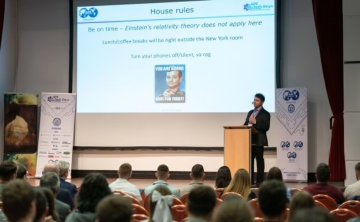
Join SPE.
One of the big reasons for the exposures I had in my life has been SPE. A place where you can learn technical skills, meet people, engage in discussions, and bring tangible changes to your communities in volunteering.
Be patient.
Be unapologetic about your passions. But also have the patience to work through the tough times and difficult challenges. Nothing sustainably great was achieved through the night. Believe in the process.
Cross train.
Expand your skills by cross training in various disciplines. This not only enriches your knowledge but places you in a better position to get the jobs you wish for.
TWA: You’ve received several awards, including the 2023 SPE Giovanni Paccaloni Young Professional Service Award, 2023 TWA Energy Influencer Award, and the 2021 SPE Regional Young Member Outstanding Service Award. What do these recognitions mean to you, and how have they impacted your career?
GG: They meant a lot.
Not because of the award itself but because a wider community believes you have made an impact. Life is about doing the best we can at what we do and, in the process, hopefully enriching others. I must admit that it feels great when you know that your passion can inspire others to be more curious and find their true passion themselves.
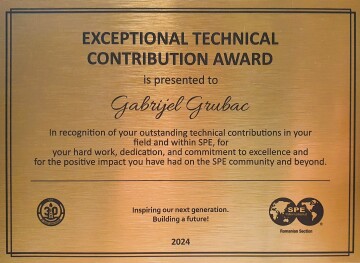
The 2023 SPE Giovanni Paccaloni Young Professional Service Award is one I hold dear to my heart. I never met Paccaloni in person but the magnitude of words I heard about him and his devotion speak for themselves. I felt honored because it is rare to find selfless individuals these days, and he seems to have been that person. I continue to volunteer because it feels right. You learn so much about others and yourself and must always keep in mind and be sure about the question: Why am I doing it?
TWA: How has your involvement with organizations like SPE shaped your professional outlook and career trajectory?
GG: Tremendously. From meeting people from all over the world, to giving lectures to young professionals and students, SPE has been a source of continuous growth for me. I enjoy the technical aspect of being able to read good papers, attending useful workshops, and enhance my technical background through this engagement.
One of my favorite parts is engaging with students. I firmly believe they need us more than ever in terms of showing them what opportunities lie ahead in the energy world. From oil and gas to geothermal, it is becoming more evident that our industry has options, and SPE is a catalyzer in this sense. It brings professionals from all realms together.
SPE has given me the opportunity to share my passion for geothermal energy and hopefully get others curious. It is a platform that allows people to explore and pick their paths of interest.
TWA: What’s the one engineering tool you couldn’t live without?
GG: Believe it or not, I have not used a calculator in years. Now, yes, I know, calculators are not the only engineering tools but since college I regarded those as one.
I enjoy out of the box thinking. The zooming out of the problems and challenges I face at work. And this engineering tool is essential in improving solutions in life. You must stop, zoom out, weigh your options, and then move forward. The great thing about this tool is, you cannot misplace it!

